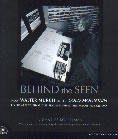

Submerged as I am in the first stages of structuring my new novel from a mass of raw manuscript material, I've spent significant time consulting the Grand Shaman of Structure--that is, the great film editor Walter Murch (The Coversation, Apocalypse Now, The Unbearable Lightness of Being, The Godfather parts I,II & III, The English Patient, The Talented Mr. Ripley).
Not consulting personally, of course, but doing perhaps the next best thing: leafing through two books that I hold to be indispensable to my creative-writing life:
The Coversations: Walter Murch and the Art of Editing Film by Michael Ondaatje (ISBN: 0-375-41386-3)
and:
Behind the Seen: How Walter Murch Edited Cold Mountain... by Charles Koppelman (ISBN: 0-7357-1426-6)
Says Master Murch (speaking, in Behind the Seen, of the editor's process in orienting oneself to a new film project. Which we might read as the author's process in orienting oneself to the structuring of a book):
"In taking editing notes the skill is to think that every line reading might have a context in which it can be good. Imagine the cuts, and the good might lie right next to the bad. Don't under any circumstances write off a take as being throughout no good. If you must, then say WHY it is no good. This sharpens your perception, as well as being a good reference later on..." (Koppelman, 169) "The first set of notes are a lover's first impression of the beloved. The second set are a surgeon's notes before making the first incision." (Koppelman, 175)
And in The Conversations (speaking about transitions and the mysterious quotient of completion):
"As I'm assembling the film, I'll be trying to find the exact moment each shot reaches its optimal maturity: I want to hold every shot on screen long enough for it to deliver the goods, but cut it off at a moment when it also has the potential to lead to something else."(Ondaatje, 238) "When you're putting a scene together, the three key things you're deciding, over and over agin, are: What shot shall I use? Where shall I begin it? Where shall I end it? An average film may have a thousand edits in it, so: three-thousand decisions. But if you can answer those questions in the most interesting, complex, musical, dramatic way, then the film will be as alive as it can be.
"For me, the most rhythmically important decision of the three is the last: Where do you end the shot? You end it at the exact moment in which it has revealed everything that it's going to reveal, in its fullness, without being overripe. If you end the shot too soon, you have the equivalent of youth cut off in its bloom. Its potential is unrealized. If you hold a shot too long, things tend to putrefy." (Ondaatje, 267)
"The decision where to cut film is very similar to the decision, in writing poetry, of where to end each line. On which word? That end point has little if anything to do with the grammar of the sentence. It's just that the line is full and ripe at that point, full of meaning and ripe with rhythm. By ending it where he does, the poet exposes that last word to the blankness of the page, which is a way of emphasizing the word. If he adds two words after it, he immerses that word within the line, and it has less visibility, less significance..."(Ondaatje, 268)
"...And one of the most fruitful paradoxes, I think, is that even when the film is finished, there should be unsolved problems. Because there's another stage, beyond the finished film: when the audience views it. You want the audience to be co-conspirators in the creation of this work, just as much as the editor or the mixers or the cameraman or the actors are...it's a wonderful dilemma: you have to acknowledge that there must be unsolved problems at each stage. As hard as you work, you must have this secret, unspoken hope that one very significant problem will remain unsolved. But you never know what that is until the film is done." (Ondaatje, 105)
Take Master Murch's filmic terminology and translate it to the novelist's lexicon by roughly the following formula: "film"=novel; "shot" or "take"=section or scene; "on the screen"=on the page -- and voila!, an abundance of inimitable novelistic wisdom has been magically distilled!

No comments:
Post a Comment